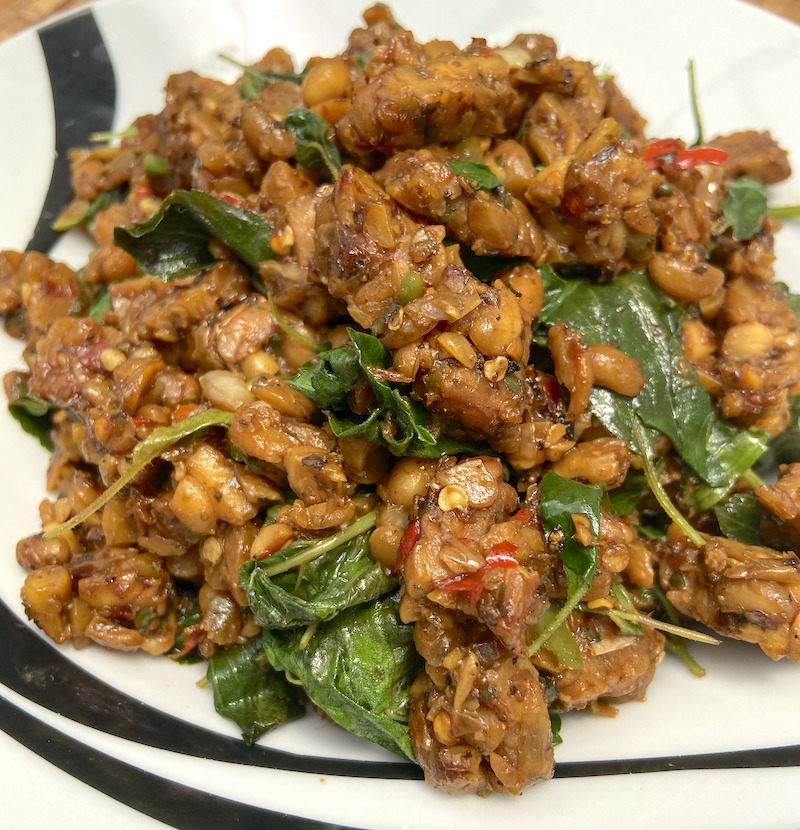During the global Covid-19 pandemic, we have been exploring new ways to engage our supporters, and fundraise for our work. Previously, our in-person classes where our sole method of generating interest in our work. However, like many other businesses, we have been scrambling to do more online and reduce the face to face nature of our interactions. Now we host online classes to help you master Thai food, but have also been making efforts to sell food products locally. The most important of these projects has been the production of plant based protein foods, tofu and tempeh.

Lately when you see the term plant based protein mentioned, the reference is usually to efforts by food scientists to make fake meat. Many of these imitation meats have even become popular globally, attempting to lure both vegans and vegetarians, as well as their healthy eating friends. However, while the popular wisdom is go high tech, we’re going the opposite direction. Instead of helping to create highly processed imitation meat, we’re leaning into the lightly processed Asian traditions of tofu and tempeh. We’re confident these products made with organic soybeans, can encourage people to reduce their meat consumption, which is better for our bodies and the environment.
The gamble we’re taking is hoping our customers will recognize the value and craft necessary to make homemade tofu and tempeh. Often these are products that can be easily misunderstood. Both are soy products, and while tofu is very well known, tempeh is still a new item in many markets. Tofu is the cooked, squeezed, and coagulated soybeans that we press into blocks. Those blocks can be sold and sliced down to be pan fried or used in stir fries and other dishes in place of meat.
While tempeh is made from the same beans and used similarly, the Indonesian creation has many of its own characteristics. For starters, the product requires you to ferment the soybeans before cooking them. Then the beans are dried and packed for a second, but more controlled fermentation. During this process, the bacteria added to the beans grow, attaching and connecting each of the beans. The result is firm patty of edible mold and beans. Despite how that sounds, you might be pleasantly surprised how tasty tempeh can be when properly cooked!
Since tempeh doesn’t enjoy the popularity of tofu, there is a learning curve to cooking it the first time. Tempeh can then be sliced and roasted, chopped, stir fried or stewed. The unique structure of tempeh, helps it to hold its shape when cooking, and gives it a toothsome bite (more similar to a meat product than tofu) when eating. Furthermore, the process of making tempeh, makes the nutrients in the beans more bioavailable, resulting in a healthy, probiotic, and protein rich source of nutrition.
We suggest new customers to slice their tempeh thin, and to start out by substituting it for meat in a few of your most flavor-packed dishes. For example, given the right amount of time to soak up flavor, tempeh makes and excellent substitution in Thailand’s coconut milk curries. Alternatively, you can take sliced tempeh, season it, and oven roast until crispy. The resulting tempeh bites can be eaten as a snack, or added as a crispy ingredient in other dishes (salads, stir fries, and sandwiches for example).
Besides saving you time in the kitchen, our tofu and tempeh products are also made from organic soy beans. Like many places around the world, soy in Thailand is a cash crop, making it difficult to source organic beans. We work with small Thai farms, especially in Northern Thailand, to source the beans, giving us an opportunity to support organic farmers. This is important because these farmers can often be priced out of local markets by the glut of GMO soybeans and mass produced soy products prevalent in most stores.

We hope everyone is striving to eat better during this stressful time. One way is to add tofu or tempeh to your diet, and make an effort to consume less meat. We should also do what we can to support our farmers, and strengthen the food ecosystems feeding our communities during crises.
We’re so proud to be providing these products, so look out for them as options in your CSA boxes from Bolan Restaurant and Farmtastic. Soon you will be able to add them as a vegetarian option to your orders with Sloane’s as well. So please be on the lookout for them!




